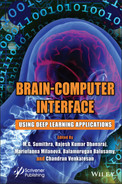BRAIN-COMPUTER INTERFACE It covers all the research prospects and recent advancements in the brain-computer interface using deep learning. The brain-computer interface (BCI) is an emerging technology that is developing to be more functional in practice. The aim is to establish, through experiences with electronic devices, a communication channel bridging the human neural networks within the brain to the external world. For example, creating communication or control applications for locked-in patients who have no control over their bodies will be one such use. Recently, from communication to marketing, recovery, care, mental state monitoring, and entertainment, the possible application areas have been expanding. Machine learning algorithms have advanced BCI technology in the last few decades, and in the sense of classification accuracy, performance standards have been greatly improved. For BCI to be effective in the real world, however, some problems remain to be solved. Research focusing on deep learning is anticipated to bring solutions in this regard. Deep learning has been applied in various fields such as computer vision and natural language processing, along with BCI growth, outperforming conventional approaches to machine learning. As a result, a significant number of researchers have shown interest in deep learning in engineering, technology, and other industries; convolutional neural network (CNN), recurrent neural network (RNN), and generative adversarial network (GAN). Audience Researchers and industrialists working in brain-computer interface, deep learning, machine learning, medical image processing, data scientists and analysts, machine learning engineers, electrical engineering, and information technologists.
Table of Contents
- Cover
- Series Page
- Title Page
- Copyright Page
- Preface
- 1 Introduction to Brain–Computer Interface: Applications and Challenges
- 2 Introduction: Brain–Computer Interface and Deep Learning
- 3 Statistical Learning for Brain– Computer Interface
- 4 The Impact of Brain–Computer Interface on Lifestyle of Elderly People
- 5 A Review of Innovation to Human Augmentation in Brain-Machine Interface – Potential, Limitation, and Incorporation of AI
- 6 Resting-State fMRI: Large Data Analysis in Neuroimaging
- 7 Early Prediction of Epileptic Seizure Using Deep Learning Algorithm
- 8 Brain–Computer Interface-Based Real-Time Movement of Upper Limb Prostheses Topic: Improving the Quality of the Elderly with Brain-Computer Interface
- 9 Brain–Computer Interface-Assisted Automated Wheelchair Control Management–Cerebro: A BCI Application
- 10 Identification of Imagined Bengali Vowels from EEG Signals Using Activity Map and Convolutional Neural Network
- 11 Optimized Feature Selection Techniques for Classifying Electrocorticography Signals
- 12 BCI – Challenges, Applications, and Advancements
- Index
- End User License Agreement
